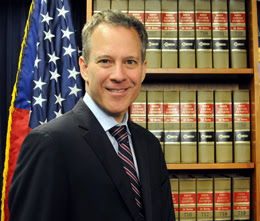
“The alleged actions by RD Legal—scamming 9/11 heroes and former NFL players struggling with severe injuries—are simply shameful. RD Legal used deceptive tactics to charge unlawfully high interest rates for advances on settlement and compensation funds, allowing them to profit off the backs of these unsuspecting individuals,” said Attorney General Schneiderman. “My office will do all it can to end the fraudulent practices employed by RD Legal, recoup the illegal amounts charged by this company — and make these victims whole again.”
“It is unconscionable that RD Legal scammed 9/11 heroes and NFL concussion victims out of millions of dollars,” said CFPB Director Richard Cordray. “We allege that this company and its owner lined their pockets with funds intended to cover medical care and other critical expenses for people who are sick and sidelined. Our lawsuit seeks to end this illegal scheme and get money back to those entitled to receive it.”
RD Legal, based in Cresskill, N.J., is a company that offers advances to consumers entitled to payouts from victim compensation funds or lawsuit settlements. The company targeted fund awardees including police, firefighters, paramedics, and others who were first responders to the World Trade Center attack on September 11, 2001. Many of these first responders suffer from cancers and other respiratory illnesses related to their exposure to dust and debris at the attack site, post‐traumatic stress disorder, depression, and memory loss. They were awarded money from the Zadroga Fund, established by Congress to assist with needs including mounting medical costs and lost income because of their inability to work. The company also targeted former NFL players who have been diagnosed with neurodegenerative diseases such as Alzheimer’s and Parkinson’s disease and were entitled to payments from the settlement in a class action lawsuit.
The CFPB and the New York Attorney General allege that RD Legal contacted these consumers after they were awarded their money but before they received most of it. RD Legal then swooped in with a “deal,” offering the victims an upfront payment of some of the money they had not yet received which would be paid back when they received the balance of the payout. Through confusing contracts, RD Legal misrepresented to consumers their obligation to repay these expensive transactions, often collecting from the consumer more than twice what RD Legal had advanced only months earlier. Today’s lawsuit alleges that RD Legal’s illegal actions cost victims, many of whom suffered long‐term physical or cognitive harm, millions of dollars.
The CFPB and the New York Attorney General allege that the defendants violated several laws, including the Dodd‐Frank Wall Street Reform and Consumer Protection Act’s prohibition on deceptive and abusive acts and practices. Specifically, the CFPB and New York Attorney General allege that RD Legal:
- Lured consumers into costly payouts by lying about the terms of the deal: Through convoluted contracts, RD Legal misrepresented to consumers what they were being offered. These misrepresentations deceived consumers, interfered with their understanding of the terms, costs, and conditions of the transactions, and prevented them from meaningfully evaluating what was being offered. The products were expensive. For example, one consumer was awarded $65,000 from the Zadroga Fund. While she waited for her full payment from the fund, RD advanced her $18,000. When her award payment from the fund arrived six months later, she had to repay $33,000 to RD Legal – so she paid $15,000 to RD above and beyond the money RD Legal advanced to her.
- Lied about speeding up the processing of consumers’ claims: RD Legal lied to consumers by claiming that it could “cut through red tape” to obtain their anticipated payments from claims administrators faster than would otherwise be possible. In fact, RD Legal had no authority or ability to change when victim compensation or settlement payouts occurred.
- Deceived consumers about when they would receive the money from RD Legal: RD Legal misrepresented to consumers when they would receive money from the company. On its website, the company promised that consumers would receive the money within several days of entering into the contract, but some consumers did not receive money until months after it was promised.
- Illegally collected money from consumers: When consumers received their payouts from their actual settlement funds, RD Legal attempted to recover its money from the victims. But the complaint alleges that the costly transactions are not valid and enforceable or they are void under New York law because they violated the state interest rate cap. As a result, no payment is due and RD Legal had no right to collect.
The Attorney General’s Office also alleges additional violations of New York state law in the complaint, including that these transactions are in fact loans under New York law with usurious interest rates. On many of these loans, RD Legal collected effective interest rates ranging from 18% to over 250%. These interest rates exceed New York’s 16% civil usury cap and its 25% criminal usury cap. Under New York law, contracts that charge more than the maximum usury rate are void. RD Legal also engaged in false advertising and deceptive, fraudulent and illegal practices under New York law.

